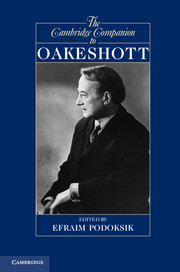Book contents
- Frontmatter
- Introduction
- Part I Oakeshott's philosophy
- Part II Oakeshott on morality, society and politics
- 6 Practical life and the critique of Rationalism
- 7 Oakeshott's ideological politics: conservative or liberal?
- 8 Rhetoric and political language
- 9 Oakeshott's On Human Conduct
- 10 Oakeshott's political theory: recapitulation and criticisms
- Part III Oakeshott and others
- Index
8 - Rhetoric and political language
from Part II - Oakeshott on morality, society and politics
Published online by Cambridge University Press: 28 September 2012
- Frontmatter
- Introduction
- Part I Oakeshott's philosophy
- Part II Oakeshott on morality, society and politics
- 6 Practical life and the critique of Rationalism
- 7 Oakeshott's ideological politics: conservative or liberal?
- 8 Rhetoric and political language
- 9 Oakeshott's On Human Conduct
- 10 Oakeshott's political theory: recapitulation and criticisms
- Part III Oakeshott and others
- Index
Summary
Aristotle was wrong (and for a Greek characteristically wrong) when he said that the ti estin of ‘politics’, what it is and what makes it possible, is the power of speech. Polis-life is certainly impossible without ‘speech’, but this is not its sufficient condition . . . What distinguishes ‘men’ from ‘animals’ is not speech but a geistige Welt. And this entails a past relationship. Men, and not animals, live in a world which is past, present, and future; men have a civilization to inherit, and they become men in so far as they possess what they have inherited, not merely in so far as they can communicate with one another in words.
INTRODUCTION
Human beings are distinguished from other animals by living in a world of ideas. They are distinguished from one another by having different ideas, and their words mark these differences. But words can obscure as well as express meaning. Oakeshott's writings give evidence of close attention to the meanings of words and especially to political words and their persistent ambiguities. Moving between historical interpretation and philosophical examination, he provides an anatomy of modern European political discourse by distinguishing its characteristic questions and argumentative idioms. He unscrambles the inherited vocabulary used to describe the modern state and to define the authority, power and purposes of government, and he considers how competing views of the state as an association have shaped political activity and reflection since the Renaissance. And he is concerned throughout to distinguish political discourse, which is persuasive and therefore inherently rhetorical rather than a matter of proof, from discourse about politics – that is, to distinguish the practical arguments of rulers and citizens from the explanatory inquiries that are (he thinks) the proper business of the political theorist.
- Type
- Chapter
- Information
- The Cambridge Companion to Oakeshott , pp. 177 - 198Publisher: Cambridge University PressPrint publication year: 2012
- 3
- Cited by



